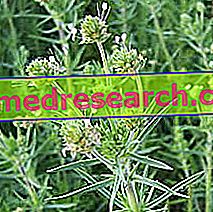
Scientific name
Plantago afra, sin. Plantago psyllium
Family
Plantaginaceae
Origin
Mediterranean basin
Used Parts
Drug consisting of mature and dried seeds
Chemical constituents
- mucilage;
- Protein;
- Iridoid glucosides;
- Fatty acids;
- triterpenes;
- Phytosterols;
- Alkaloids (indicaina, indica mina, plantagonina)
Psyllium in Herbal Medicine: Properties of Psyllium
Psyllium and its seeds are mainly used in the treatment of constipation, thanks to the mucilaginous coating they are equipped with.
Biological activity
As mentioned, the use of psyllium has received official approval for the treatment of constipation and constipation. The seeds of this plant are in fact equipped with a mucilaginous coating capable of absorbing large quantities of water and swelling.
Therefore, when psyllium seeds are ingested, the mucilages that cover them reach the intestine, where they absorb water and swell, increasing the volume of intestinal contents. This increase, in turn, stimulates the peristalsis of the same intestine and facilitates evacuation (mass laxative).
Moreover, from an in vitro study, it emerged that the methanolic extract of psyllium is able to exert an interesting antioxidant activity which appears to be performed through a radical scavenging mechanism.
Finally, it seems that the regular intake of psyllium powder can be useful in decreasing the blood levels of total cholesterol and LDL cholesterol, without however affecting HDL cholesterol levels and triglyceride blood levels.
Psyllium against constipation
Thanks to their mucilaginous coating, psyllium seeds are a valid and effective remedy to combat constipation and constipation.
Of course, for the treatment of the aforementioned disorders, psyllium must be taken internally.
If psyllium is used in the form of a liquid extract (1: 1 solvent / drug ratio, using 25% ethanol as an extraction solvent), we generally recommend taking about 2-5 ml of product per day.
Psyllium in folk medicine and in homeopathy
In folk medicine, psyllium is used for the treatment of cystitis, while its laxative action is exploited in all those cases in which there is the need to soften the feces and favor the evacuation, such as, for example, during pregnancy, in elderly people, in case of hemorrhoids or following ano-rectal surgery.
Externally, on the other hand, psyllium is used in traditional medicine to combat furunculosis.
As far as homeopathic medicine is concerned, psyllium is not currently used in this field.
Side effects
If psyllium is correctly used, it should not cause any side effects.
However, in sensitive individuals allergic reactions may occur in the form of asthma, rhinitis, urticaria or conjunctivitis.
Furthermore, if psyllium is not taken with an adequate fluid intake, bowel obstruction may occur, especially in elderly patients.
Contraindications
Avoid taking psyllium in the event of hypersensitivity to one or more components. Furthermore, the use of psyllium is contraindicated also in patients suffering from intestinal occlusion or sub-occlusion, inflammatory pathologies of the gastrointestinal tract and / or diabetes mellitus.
Pharmacological Interactions
Because of the mucilages contained in it, psyllium can reduce intestinal absorption, and therefore the therapeutic efficacy, of any drugs or substances (such as, for example, anticoagulants, antidiabetics, vitamin B12, calcium, magnesium, copper, zinc) administered 30 to 60 minutes before or after taking psyllium seeds.
Warnings
To favor the laxative effect and to avoid the onset of unpleasant and not indifferent undesired effects (see paragraph "Side effects"), it is fundamental to take psyllium and its preparations with an abundant quantity of water.



